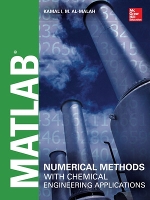|
|
mathematical & statistical software
|
|



|
|
| book details |
MATLAB Numerical Methods with Chemical Engineering Applications
By (author) Kamal Al-Malah

|
This book is currently unavailable. Enquire to check if we can source a used copy
|
| book description |
Publisher's Note: Products purchased from Third Party sellers are not guaranteed by the publisher for quality, authenticity, or access to any online entitlements included with the product. A practical, professional guide to MATLABcomputational techniques and engineering applicationsMATLAB Numerical Methods with Chemical Engineering Applications shows you, step by step, how to use MATLAB® to model and simulate physical problems in the chemical engineering realm. Written for MATLAB 7.11, this hands-on resource contains concise explanations of essential MATLAB commands, as well as easy-to-follow instructions for using the programming features, graphical capabilities, and desktop interface. Every step needed toward the final solution is algorithmically explained via snapshots of the MATLAB platform in parallel with the text. End-of-chapterproblems help you practice what you've learned. Master this powerful computational tool using this detailed, self-teaching guide. COVERAGE INCLUDES: MATLAB basics Matrices MATLAB scripting language: M-file Image and image analysis Curve-fitting Numerical integration Solving differential equations A system of algebraic equations Statistics Chemical engineering applications MATLAB Graphical User Interface Design Environment (GUIDE)
| product details |
Normally shipped |
Publisher | McGraw-Hill Education - Europe
Published date | 16 Aug 2013
Language |
Format | Hardback
Pages | 384
Dimensions | 236 x 198 x 28mm (L x W x H)
Weight | 823g
ISBN | 978-0-0718-3128-4
Readership Age |
BISAC | computers / mathematical & statistical software
| other options |
|
|
|
To view the items in your trolley please sign in.
| sign in |
|
|
|
| specials |
|
|
This first comprehensive biography of Cecil Rhodes in a generation illuminates Rhodes’s vision for the expansion of imperialism in southern Africa, connecting politics and industry to internal development, and examines how this fueled a lasting, white-dominated colonial society.
|
Let's stare the future down and, instead of fearing AI, become solutionists.
|
|
|
|
|